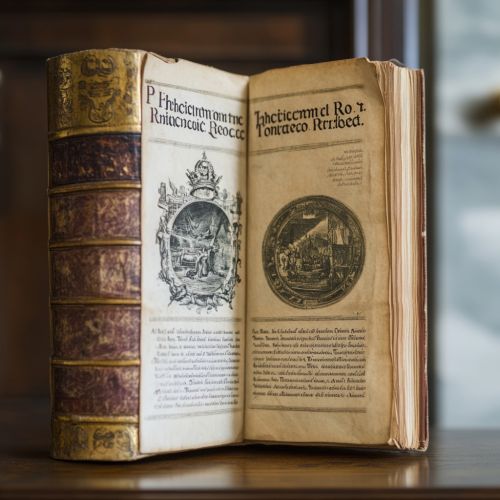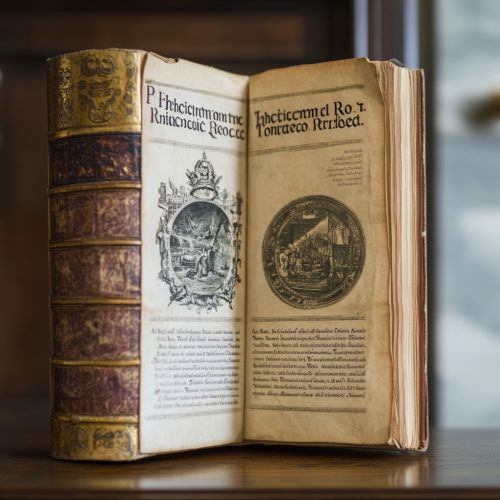Philosophical Transactions of the Royal Society: Difference between revisions
(Created page with "== Introduction == The '''Philosophical Transactions of the Royal Society''' is a scientific journal published by the Royal Society of London. Established in 1665, it is the world's longest-running scientific journal and has played a pivotal role in the dissemination of scientific knowledge. The journal is divided into two series: Series A, which focuses on the physical sciences, and Series B, which covers the biological sciences. == Historical Background == The inc...") |
No edit summary |
||
| Line 53: | Line 53: | ||
The Philosophical Transactions of the Royal Society remains a cornerstone of scientific publishing. Its long history and ongoing commitment to excellence make it a vital resource for researchers and scholars worldwide. As science continues to evolve, the journal will undoubtedly continue to play a crucial role in the dissemination of knowledge and the advancement of human understanding. | The Philosophical Transactions of the Royal Society remains a cornerstone of scientific publishing. Its long history and ongoing commitment to excellence make it a vital resource for researchers and scholars worldwide. As science continues to evolve, the journal will undoubtedly continue to play a crucial role in the dissemination of knowledge and the advancement of human understanding. | ||
[[Image:Detail-97453.jpg|thumb|center|An image of the first issue of Philosophical Transactions of the Royal Society, showing its historical cover page.|class=only_on_mobile]] | |||
[[Image:Detail-97454.jpg|thumb|center|An image of the first issue of Philosophical Transactions of the Royal Society, showing its historical cover page.|class=only_on_desktop]] | |||
== See Also == | == See Also == | ||
Latest revision as of 11:41, 3 August 2024
Introduction
The Philosophical Transactions of the Royal Society is a scientific journal published by the Royal Society of London. Established in 1665, it is the world's longest-running scientific journal and has played a pivotal role in the dissemination of scientific knowledge. The journal is divided into two series: Series A, which focuses on the physical sciences, and Series B, which covers the biological sciences.
Historical Background
The inception of the Philosophical Transactions can be traced back to the early days of the Royal Society, which was founded in 1660. The journal was the brainchild of Henry Oldenburg, the Society's first secretary, who envisioned a platform for scientists to share their discoveries. The first issue was published on March 6, 1665, and included articles on a variety of topics, from astronomy to medicine.
Early Years
In its early years, the Philosophical Transactions served as a repository for the latest scientific findings and theories. It was instrumental in the development of the scientific method, providing a forum for the exchange of ideas and the validation of experimental results. The journal's early contributors included luminaries such as Isaac Newton, Robert Hooke, and Antonie van Leeuwenhoek.
Evolution Over Centuries
Over the centuries, the journal has evolved in response to the changing landscape of science. In the 19th century, it was divided into two series to accommodate the growing specialization within the scientific community. Series A was dedicated to the physical sciences, while Series B focused on the biological sciences. This division allowed for more targeted dissemination of research findings and facilitated the growth of specialized fields.
Structure and Content
The Philosophical Transactions is structured to provide a comprehensive overview of current research in the physical and biological sciences. Each issue typically includes original research articles, review articles, and sometimes special issues dedicated to specific themes or conferences.
Research Articles
Original research articles are the cornerstone of the journal. These articles undergo a rigorous peer review process to ensure the validity and significance of the findings. The topics covered are diverse, ranging from quantum mechanics to genomics.
Review Articles
Review articles provide a synthesis of existing research on a particular topic. These articles are invaluable for researchers looking to gain a comprehensive understanding of a specific field. They often highlight emerging trends and identify areas for future research.
Special Issues
Occasionally, the journal publishes special issues that focus on a particular theme or are dedicated to the proceedings of a scientific conference. These issues provide a deep dive into specific topics and often include contributions from leading experts in the field.
Impact and Influence
The Philosophical Transactions has had a profound impact on the development of modern science. It has been a platform for some of the most significant scientific discoveries and theories in history.
Notable Contributions
Among the many groundbreaking contributions published in the journal are Newton's laws of motion, Hooke's law of elasticity, and Leeuwenhoek's observations of microorganisms. These contributions have laid the foundation for entire fields of study and have had a lasting impact on science and society.
Citation and Impact Factor
The journal is highly regarded in the scientific community and has a high impact factor. It is frequently cited in other scientific publications, reflecting its importance as a source of reliable and influential research.
Editorial Process
The editorial process for the Philosophical Transactions is designed to maintain the highest standards of scientific integrity and quality.
Submission and Review
Authors submit their manuscripts through an online submission system. Each manuscript is initially reviewed by the editorial board to assess its suitability for the journal. If deemed appropriate, the manuscript is then sent to experts in the field for peer review. The reviewers provide feedback on the manuscript's methodology, significance, and clarity.
Acceptance and Publication
Based on the reviewers' feedback, the editorial board makes a decision on whether to accept, revise, or reject the manuscript. Accepted manuscripts undergo further editing for clarity and formatting before being published. The journal is published monthly, with each issue available both in print and online.
Digital Transformation
In recent years, the Philosophical Transactions has embraced digital technology to enhance accessibility and dissemination.
Online Access
The journal is available online through the Royal Society's website. Subscribers can access current and past issues, and individual articles can be purchased or accessed through institutional subscriptions.
Open Access
In line with the global movement towards open access, the journal offers an open access option for authors. This allows their research to be freely accessible to the public, increasing the reach and impact of their work.
Conclusion
The Philosophical Transactions of the Royal Society remains a cornerstone of scientific publishing. Its long history and ongoing commitment to excellence make it a vital resource for researchers and scholars worldwide. As science continues to evolve, the journal will undoubtedly continue to play a crucial role in the dissemination of knowledge and the advancement of human understanding.


